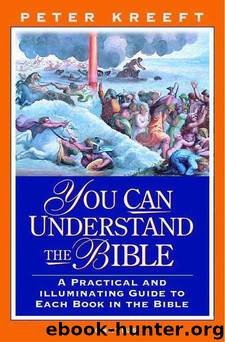You Can Understand The Bible by Kreeft Peter

Author:Kreeft, Peter [Kreeft, Peter]
Format: epub
Tags: Spiritual & Religion
ISBN: 9781586170455
Publisher: Ignatius Press
Published: 2009-11-23T15:20:22+00:00
Malachi: God Has Been Neglected, and Evildoers Will Not Go Unpunished
His name means “my messenger” or “messenger of God”. His book prophesies the coming of “my messenger to prepare the way for me, and the Lord whom you seek will suddenly come to his temple” (3:1). This “messenger” was John the Baptist (see Is 40:3), who prepared the way for Christ. John would not appear for over four hundred years. Malachi is apparently the last Old Testament prophet—unless Daniel was written much later than the rabbinic tradition has believed. He is followed by four hundred years of silence from God. The silence was broken by John the Baptist’s voice quoting Isaiah 40:3 (Mt 3:3). Jesus called John the greatest of the prophets (Mt 11:11). Malachi may have been the closest to him in time. He is at least the closest to him in the pages of the Bible.
The problem Malachi addressed in his own time was smugness and a false sense of security. Even many of the priests were corrupt, and many people questioned whether it paid to obey God, since the wicked seemed to prosper. Their attitude was not simple and clear rebellion against God, but coldness of heart, legalism, and materialistic dullness and dryness and dimness of spirit. This was just the type of attitude that, according to Matthew’s Gospel, the Pharisees and Sadducees showed in Jesus’ day and that Jesus condemned as harshly as the prophets did.
Malachi addresses this problem in a question-and-answer form, as a dialogue with God. His answer to the great problem of evil (if God is just, why do the wicked prosper and the righteous suffer?) is first of all that the people have neglected God, God has not neglected them. Second, their evil will not go unpunished, as the history of Edom shows. As with Habakkuk, the answer to the problem of evil is “wait.” The “day of the Lord” will come, and then it will be clear that it is not “vain to serve God” (3:14).
Malachi (and the whole Old Testament) ends by mentioning Moses (4:4) and Elijah (4:5), who appeared with Christ on the Mountain of Transfiguration (Mt 17:3). The promise to send an Elijah (4:5) was fulfilled by John the Baptist (Mt 17:10-13), who prepares for “the great and terrible day of the Lord”, the coming of Christ. The whole Old Testament has been like an arrow, and here is its tip, pointing to the center of the target, the center of all things (Col 1:17), Christ.
Download
This site does not store any files on its server. We only index and link to content provided by other sites. Please contact the content providers to delete copyright contents if any and email us, we'll remove relevant links or contents immediately.
The Five People You Meet in Heaven by Mitch Albom(3549)
The Secret Power of Speaking God's Word by Joyce Meyer(3154)
Real Sex by Lauren F. Winner(3002)
Name Book, The: Over 10,000 Names--Their Meanings, Origins, and Spiritual Significance by Astoria Dorothy(2969)
The Holy Spirit by Billy Graham(2938)
0041152001443424520 .pdf by Unknown(2842)
How The Mind Works by Steven Pinker(2811)
ESV Study Bible by Crossway(2772)
Ancient Worlds by Michael Scott(2675)
Churchill by Paul Johnson(2576)
The Meaning of the Library by unknow(2563)
The ESV Study Bible by Crossway Bibles(2546)
The Gnostic Gospels by Pagels Elaine(2517)
MOSES THE EGYPTIAN by Jan Assmann(2411)
Jesus by Paul Johnson(2349)
City of Stairs by Robert Jackson Bennett(2337)
The Complete Dead Sea Scrolls in English (7th Edition) (Penguin Classics) by Geza Vermes(2269)
The Nativity by Geza Vermes(2222)
Ancient Near Eastern Thought and the Old Testament by John H. Walton(2219)
